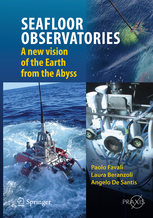The ocean covers 70% of the Earth’s surface, and it has a strong influence on the planet’s environment but its make-up and nature are still largely unknown. Better comprehending the ocean’s role and understanding the complex physical, biological, chemical and geological systems operating within it pose major challenges for scientists today.
Paolo Favali, Laura Beranzoli and Angelo De Santis, researchers who have dedicated a large part of their lives to studying the ocean, have gathered the world’s experts in the field and have brought their findings together in this comprehensive book which sums up the current status of marine research.
Seafloor Observatories examines the role of ocean technologies in addressing “grand challenges” such as climate change, ecosystem destruction and biodiversity threats. In doing so it offers new perspectives by answering the important question: “How can continuous and reliable monitoring at the sea by means of seafloor observatories best extend exploration and improve knowledge of our planet?”.
This book is a journey through today’s scientific challenges to be addressed with seafloor observatories and the technical solutions for their architecture. It allows access to some relevant scientific multidisciplinary results and how they will yield significant improvements and exert a strong impact not only on the current knowledge of our planet but also on human evolution.
“A new window is open on the Blue Planet – writes one of the authors in the Conclusions – and ‘A new vision of the Earth from the Abyss’ is in our hands.” Ocean Observatories. Published by Springer-Verlag Berlin Heidelberg. Pages 676. The book is available online (ISBN 978-3-642-11374-1) and will be in bookstores starting June 14, 2015 (ISBN 978-3-642-11373-4).


